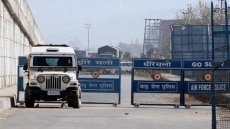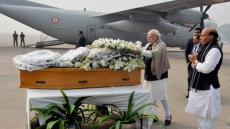With the Congress deciding to serve a breach of privilege notice against the union minister Smriti Irani for allegedly misleading parliament on the JNU controversy and the suicide by Dalit scholar Rohith Vemula, experts say the Minister could be hauled up if she had "knowingly" misled the two houses.
“Certainly, if she has done knowingly,” said former Lok Sabha Speaker Somnath Chatterjee told IANS on the phone from Kolkata.
Human Resource Development Minister Smriti Irani's claim that doctor and police were not allowed to reach Vemula's room in hostel and the situation was used for political mileage has been contested by Hyderabad University's medical officer, P. Rajshree, who had attended on the deceased and on his mother Radhika and others.
Rule 222 of the Lok Sabha's Rules of Procedure and Conduct of Business says: “A member may, with the consent of the Speaker, raise a question involving a breach of privilege either of a member or of the House or of a Committee thereof.”
However, it is for the Lok Sabha speaker to allow the privilege notice. The procedure is similar for Rajya Sabha, with the chairman having to give his consent.
Rajshree has said that she reached the spot within five to seven minutes after being informed of the suicide. By then, the scholar was already dead and there was no scope of reviving him.

Participating in debate in Lok Sabha on February 24, Irani had said: “... Nobody allowed a doctor near this child, to revive this child, to take him to the hospital. Nobody allowed a doctor near him. The police has reported that not one attempt was made to revive this child, not one attempt was made to take him to a doctor. Instead what was done was that his body was used as a political tool, hidden. No police was allowed till 6.30 the next morning.…”
Former Lok Sabha secretary general Subhash Kashyap said: “If a person says on the floor of the house something which is incorrect or untrue and does so to willfully, deliberately to mislead the house, then a question of privilege may be involved. Any member of the house can give notice to the speaker requesting that he may be allowed to raise it as a privilege. Thereafter, it will depend on the speaker.
However, Kashyap said that it would be for the speaker to accept the version of a minister or a member if they retract on their earlier statement.
Not only has Irani's account of the events subsequent to Vemula's suicide been questioned, but even the organizers of a Mahishasura Divas on the JNU campus have disputed a pamphlet that the minister had read out from in the two houses. They have denied that the pamphlet was theirs.
Can a minister or a member of the parliament read out from a document whose veracity is yet to be ascertained?
“The minister is responsible for whatever he/she says or the document she relies upon,” Kashyap said.
Though the Congress has declared it would move a privilege notice against Irani, the Left parties have yet to take a call.

“We, the left parties, are yet to consult among ourselves. We will decide on Sunday,” said D. Raja of the Communist Party of India, a Rajya Sabha member.


